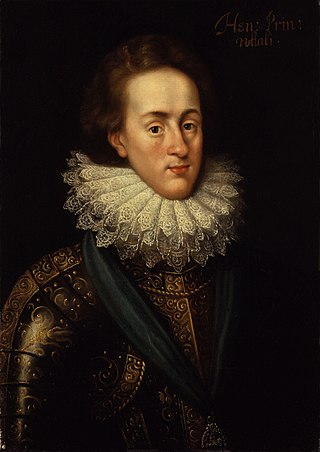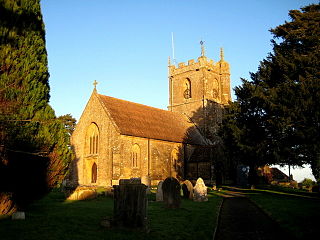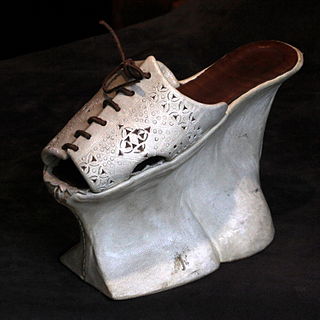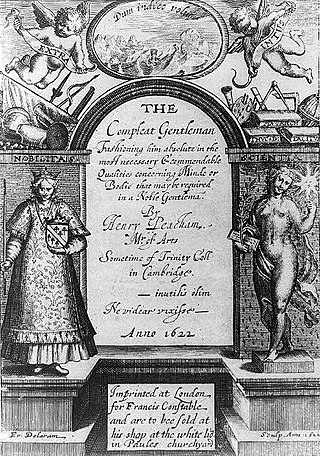
Coryat's Crudities: Hastily gobled up in Five Moneth's Travels is a travelogue published in 1611 by Thomas Coryat (sometimes also spelled "Coryate" or "Coriat") of Odcombe, an English traveller and mild eccentric.

Coryat's Crudities: Hastily gobled up in Five Moneth's Travels is a travelogue published in 1611 by Thomas Coryat (sometimes also spelled "Coryate" or "Coriat") of Odcombe, an English traveller and mild eccentric.
The book is an account of a journey undertaken, much of it on foot, in 1608 through France, Italy, Germany, and other European countries. Coryat conceived of the 1,975-mile (3,175 km) voyage to Venice and back in order to write the subsequent travelogue dedicated to Henry, Prince of Wales, at whose court he was regarded as somewhat of a buffoon and jester, rather than the wit and intellectual he considered himself. The extent to which Coryat invited such ridicule in pursuit of patronage and court favour is unclear. [1]
The year 1608, when Coryat made his journey, was a period of relative peace in France following the end of both the French Wars of Religion (1562–1598), and the Franco-Spanish War (1595–1598) in northern France. Coryat's anecdotes of how the Spanish took Calais in 1596, and Amiens with a bag of walnuts in 1597, [2] were recent events in 1608.
Among other things, Coryat's book introduced the use of the fork to England [3] and, in its support of continental travel, helped to popularize the idea of the Grand Tour that rose in popularity later in the century. The book also included what is likely the earliest English rendering of the legend of William Tell.
The work is particularly important to music historians for giving extraordinary details of the activities of the Venetian School, one of the most famous and progressive contemporary musical movements in Europe. The work includes an elaborate description of the festivities at the church of San Rocco in Venice, with polychoral and instrumental music by Giovanni Gabrieli, Bartolomeo Barbarino, and others. [4]
The book appeared with engravings by William Hole, and the author received a pension. [5]
Crudities was only twice reprinted at the time, so the first edition is quite rare today. Later, "modern" facsimiles were put out, in 1776 and 1905, which included the later trip to Persia & India.
A custom of Renaissance humanists was to contribute commendatory verses that would preface the works of their friends. In the case of this book, a playful inversion of this habit led to a poetic collection that firstly refused to take the author seriously; and then took on a life of its own. Prince Henry as Coryat's patron controlled the situation; and willy-nilly Coryat had to accept the publication with his book of some crudely or ingeniously false panegyrics from 55 contemporary wits and poets of his acquaintance, including John Donne, Ben Jonson, Inigo Jones, and Thomas Roe. Further, the book was loaded with another work, Henry Peacham's Sights and Exhibitions of England, complete with a description of a perpetual motion machine by Cornelis Drebbel. [6]
There were poems in seven languages. Donne wrote in an English/French/Italian/Latin/Spanish macaronic language. Peacham's was in what he called "Utopian", which was partly gibberish, and the pseudonymous Glareanus Vadianus (tentatively John Sanford) wrote something close to literary nonsense. The contribution of John Hoskyns is called by Noel Malcolm "the first specimen of full-blown literary English nonsense poetry in the seventeenth century". [7]
In the same year that the book was published, a pirate version of the verses appeared, published by Thomas Thorpe, under the title The Odcombian Banquet (1611). [8]
British travel writer and humourist Tim Moore retraced the steps of Coryat's tour of Europe, as recounted in his 2001 book Continental Drifter.

Benjamin Jonson was an English playwright and poet. Jonson's artistry exerted a lasting influence on English poetry and stage comedy. He popularised the comedy of humours; he is best known for the satirical plays Every Man in His Humour (1598), Volpone, or The Fox, The Alchemist (1610) and Bartholomew Fair (1614) and for his lyric and epigrammatic poetry. He is regarded as "the second most important English dramatist, after William Shakespeare, during the reign of James I."

Henry Frederick, Prince of Wales,, was the eldest son and heir apparent of James VI and I, King of England and Scotland; and his wife Anne of Denmark. His name derives from his grandfathers: Henry Stuart, Lord Darnley; and Frederick II of Denmark. Prince Henry was widely seen as a bright and promising heir to his father's thrones. However, at the age of 18, he predeceased his father, dying of typhoid fever. His younger brother Charles succeeded him as heir apparent to the English, Irish, and Scottish thrones.
This article contains information about the literary events and publications of 1611.
This article contains information about the literary events and publications of 1608.

Bishop Richard Corbet was an English clergyman who rose to be a bishop in the Church of England. He is also remembered as a humorist and as a poet, although his work was not published until after his death.
Bartolomeo Barbarino was an Italian composer and singer of the early Baroque era. He was a virtuoso falsettist, and one of the most enthusiastic composers of the new style of monody.

Thomas Coryat was an English traveller and writer of the late Elizabethan and early Jacobean age. He is principally remembered for two volumes of writings he left regarding his travels, often on foot, through Europe and parts of Asia. He is often credited with introducing the table fork to England, with "Furcifer" becoming one of his nicknames. His description of how the Italians shielded themselves from the sun resulted in the word "umbrella" being introduced into English.

Odcombe is a village and civil parish in south Somerset, England, 3 miles (4.8 km) west of the town of Yeovil, with a population of 759 in 2011.

A chopine is a type of women's platform shoe that was popular in the 15th, 16th and 17th centuries. Chopines were originally used as a patten, clog, or overshoe to protect shoes and dresses from mud and street soil.
Nationality words link to articles with information on the nation's poetry or literature.
Nationality words link to articles with information on the nation's poetry or literature.
Walter Burre was a London bookseller and publisher of the Elizabethan and Jacobean eras, best remembered for publishing several key texts in English Renaissance drama.
George Eld was a London printer of the Jacobean era, who produced important works of English Renaissance drama and literature, including key texts by William Shakespeare, Ben Jonson, Christopher Marlowe, and Thomas Middleton.
William Stansby (1572–1638) was a London printer and publisher of the Jacobean and Caroline eras, working under his own name from 1610. One of the most prolific printers of his time, Stansby is best remembered for publishing the landmark first folio collection of the works of Ben Jonson in 1616.

Sir Edward Phelips was an English lawyer and politician, the Speaker of the English House of Commons from 1604 until 1611, and subsequently Master of the Rolls from 1611 until his death in 1614. He was an elected MP from 1584, and in 1588, following a successful career as a lawyer, he commissioned Montacute House to be built as a country house for himself and his family on the family estate in Somerset. He was knighted in 1603 and one of his major roles was as the opening prosecutor during the trial of the Gunpowder Plotters.
Nationality words link to articles with information on the nation's poetry or literature.
Sir Robert Dallington (1561–1637) was an English courtier, travel writer and translator, and master of the London Charterhouse.

Henry Peacham was an English poet and writer, known today primarily for his book, The Compleat Gentleman, first printed in 1622.
Sir Henry Goodyer, also spelled Goodere and Goodier, was an English landowner and courtier, remembered today mainly for his close friendship with John Donne.